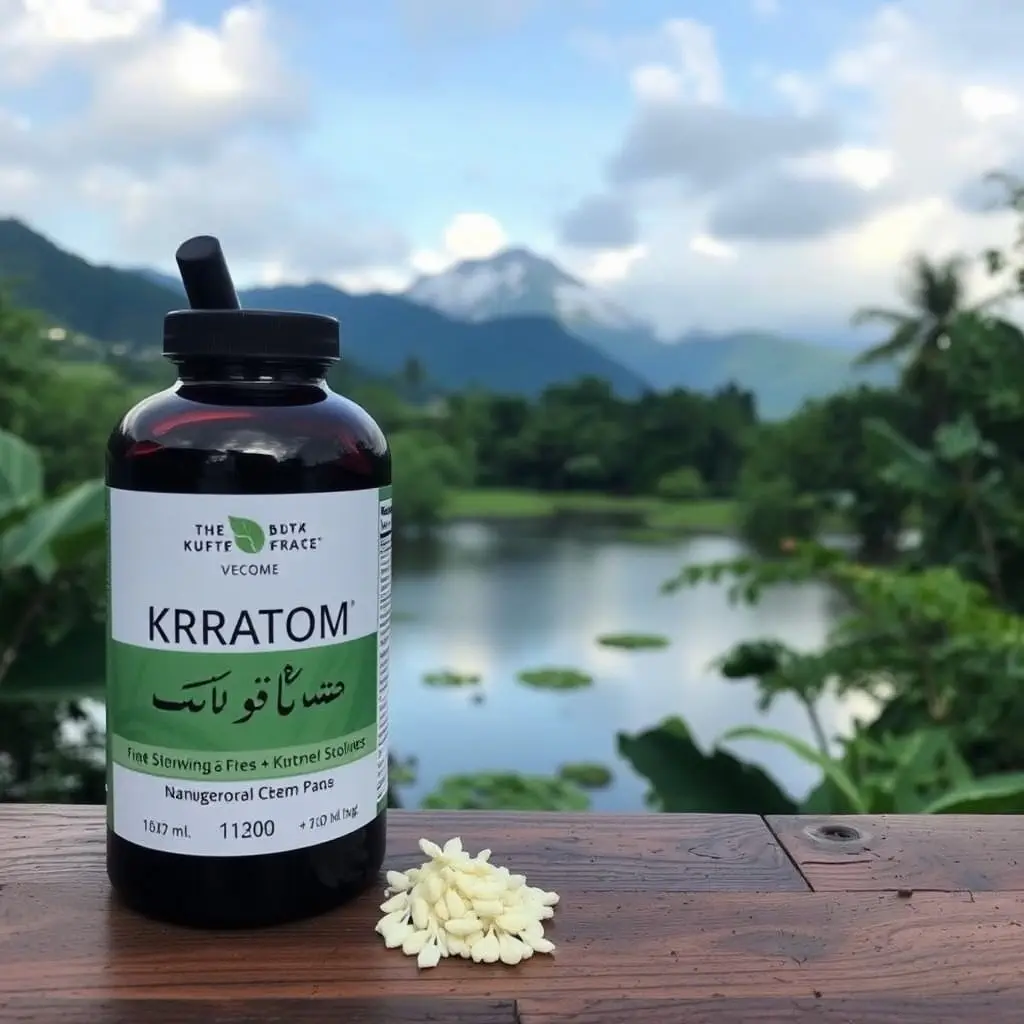Kratom, a natural supplement derived from the Mitragyna speciosa tree, is used for stress and anxiety management, with its alkaloids providing stimulant or sedative effects that interact with brain receptors. The various kratom strains, such as Indo, Maeng Da, Bali, and Thai, have distinct characteristics that can influence mood and energy levels. It's crucial for users to understand the correct dosage and strain selection for desired outcomes. Kratom's legal status is complex and varies by location, necessitating careful research, particularly for travelers. When traveling with kratom, it's imperative to verify its legality in each destination due to significant differences across states and countries. Ensuring compliance with local laws and purchasing high-quality, lab-tested kratom from reputable suppliers are essential for safe and responsible use on the move. For those considering kratom for stress relief, a moderate approach is recommended, starting with a low dosage to gauge individual sensitivity. Additionally, due to the ever-changing nature of kratom legislation, staying informed about current laws is crucial for travelers who wish to legally transport kratom, as per TSA and customs regulations. Always consult a healthcare professional before incorporating kratom into your wellness routine, and be aware that the legality and safety of kratom can vary greatly depending on where you are in the world.
Exploring the potential of kratom as a natural supplement for managing stress and anxiety, this article delves into its applications, safety measures, and legal considerations. Understanding kratom’s role in stress relief is crucial for those seeking alternative methods to navigate the complexities of mental well-being. As we navigate the legal landscape surrounding kratom, including can you travel with kratom, it’s essential to ensure compliance and safety. This guide will also provide insights on integrating kratom into your daily routine effectively. By combining empirical evidence with practical advice, this article serves as a comprehensive resource for those interested in the therapeutic benefits of kratom for stress reduction and anxiety management.
- Understanding Kratom: A Natural Approach to Stress Relief and Anxiety Management
- The Legal Landscape and Travel Considerations for Carrying Kratom
- Integrating Kratom into Your Routine Safely and Effectively for Stress Reduction
Understanding Kratom: A Natural Approach to Stress Relief and Anxiety Management

Kratom, a plant native to Southeast Asia, has gained attention as a natural supplement for managing stress and anxiety. Its leaves contain compounds known as alkaloids, which can interact with the brain’s receptors, potentially offering both stimulant and sedative effects. When considering kratom for stress relief and anxiety management, it’s crucial to understand its various strains—Indo, Maeng Da, Bali, and Thai, among others—each with distinct effects that can influence mood and energy levels. For those exploring alternative methods to mitigate anxiety, kratom offers a unique option, though it’s important to approach its use with caution and informed guidance. When integrating kratom into your wellness regimen, understanding the appropriate dosage and strain is key for desired outcomes.
Safety and legality surrounding kratom are subjects of ongoing debate; therefore, potential users must research and adhere to local laws. If travel is a part of your routine, it’s essential to know whether kratom is legal in the destinations you plan to visit, as its status can vary by state or country. The question of ‘Can you travel with kratom?’ is one that requires careful consideration based on the jurisdiction you are in or passing through. Properly understanding and respecting these legal boundaries is a critical aspect of responsibly incorporating kratom into your lifestyle, especially when on the move. Always prioritize safety by sourcing high-quality, lab-tested kratom products from reputable vendors to ensure purity and efficacy.
The Legal Landscape and Travel Considerations for Carrying Kratom

When considering the use of kratom supplements for stress and anxiety management, it’s crucial to navigate the legal landscape that governs its possession and transport across different jurisdictions. Kratom, derived from the Mitragyna speciosa tree, has various effects on the body, which can be beneficial for some individuals seeking relief from stress and anxiety. However, its legal status is subject to change and varies by state, country, and international borders. As of now, the DEA previously classified kratom as a Schedule I substance but retracted this classification following public outcry and legislative intervention. This underscores the importance of staying informed about the current status of kratom in the jurisdiction you’re in or traveling to. When planning travel with kratom, it’s essential to research the specific laws of the places you will be visiting. Some regions have strict regulations that may classify kratom as a controlled substance, while others allow for its legal purchase and possession within certain limits. Travelers must adhere to these guidelines to avoid legal complications. It’s also wise to keep up with the latest news on kratom legislation, as policies can shift rapidly, potentially affecting your travel plans. Always check the Transportation Security Administration (TSA) guidelines if you’re flying, as well as customs regulations for any international travel, to ensure that you can legally carry kratom during your journey. Being prepared and knowledgeable about these aspects of the legal landscape is key to safely incorporating kratom into your stress management routine while traveling.
Integrating Kratom into Your Routine Safely and Effectively for Stress Reduction

When considering the integration of kratom supplements into your routine for stress reduction, it is imperative to approach this holistically, taking into account both the potential benefits and the safety measures required. Kratom, derived from the leaves of the Mitragyna speciosa tree, has been recognized for its alkaloid compounds that may influence mood and provide relaxing effects. To harness these properties effectively for stress management, it is essential to start with a low dose to gauge individual sensitivity, as kratom’s impact can vary greatly from person to person. Consistency is key; establishing a regular, moderate intake can help maintain the desired calming effect without overburdening your system.
Before incorporating kratom into your daily regimen, it is crucial to conduct thorough research on the legality of traveling with kratom, as well as its use within your jurisdiction. The legal status of kratom can be complex and varies by state and country, which directly affects whether you can travel with kratom products. Always ensure that you are in compliance with local laws and regulations, and consider consulting with a healthcare professional before making kratom a part of your stress-reduction strategy. Additionally, be mindful of the source from which you obtain kratom, as the quality and purity can significantly influence its efficacy and safety. Purchasing from reputable vendors who provide third-party lab results can help mitigate risks and ensure that you are travel-ready with your kratom supplements in a legal and safe manner.
Considering the growing prevalence of stress and anxiety in modern life, exploring effective, natural remedies is increasingly important. Kratom, a botanical supplement, has emerged as a promising option for those seeking relief. This article has delved into understanding kratom’s role in stress management and anxiety mitigation. It has outlined the legal considerations necessary when traveling with kratom, ensuring adherence to the varying regulations across jurisdictions. Furthermore, it has provided guidance on safely and effectively incorporating kratom into daily routines for optimal stress reduction benefits. In conclusion, while kratom may not be a panacea, it holds potential as part of a holistic approach to wellness, offering an alternative to conventional medications with their potential side effects. As with any supplement, it is crucial to consult healthcare professionals and stay informed about the latest research to make informed decisions about its use.






